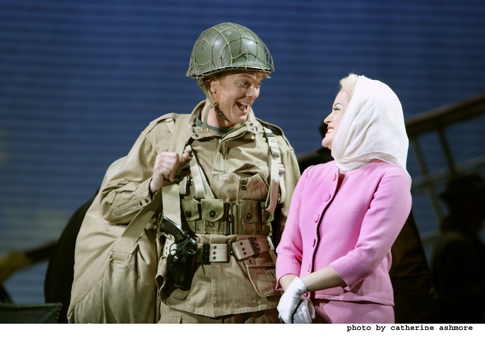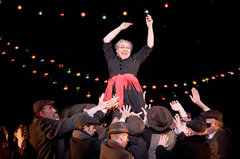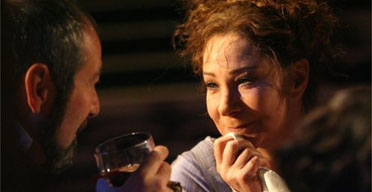 Meet Amanda Price (Jemima Rooper), bored with her job, her boorish boyfriend and generally jaded with life. There's nothing she likes better than curling up with a good book (and half a pint of wine) and losing herself in the world of Jane Austen's Pride and Prejudice. Then one night after a drunken proposal from her boyfriend, Amanda while chewing on a piece of toast and possibly contemplating moving and not telling her boyfriend, hears a sound in her bathroom, arms herself with rolled up copy of Heat and discovers a night capped young woman pawing her underwear.
Meet Amanda Price (Jemima Rooper), bored with her job, her boorish boyfriend and generally jaded with life. There's nothing she likes better than curling up with a good book (and half a pint of wine) and losing herself in the world of Jane Austen's Pride and Prejudice. Then one night after a drunken proposal from her boyfriend, Amanda while chewing on a piece of toast and possibly contemplating moving and not telling her boyfriend, hears a sound in her bathroom, arms herself with rolled up copy of Heat and discovers a night capped young woman pawing her underwear.  It transpires that the young lady is Elizabeth Bennet (Gemma Arterton), who has travelled through a door from her house to Amanda's bathroom. Before much more can be discovered Amanda's boyfriend calls out which distracts her momentarily so when she looks back, Elizabeth is gone.
It transpires that the young lady is Elizabeth Bennet (Gemma Arterton), who has travelled through a door from her house to Amanda's bathroom. Before much more can be discovered Amanda's boyfriend calls out which distracts her momentarily so when she looks back, Elizabeth is gone. Amanda seems a little obsessed with Pride and Prejudice; in a visit to her Mum's (Pippa Hayward, who appears to have an problem with untidiness and paint pot samplers) she explains that it is the regency period that is so vividly described, the mores and manners, which beguile her. Her Mum sighs and gloomily states that Amanda's ideals probably won't be able to help her into her coat when she's seventy.
Amanda seems a little obsessed with Pride and Prejudice; in a visit to her Mum's (Pippa Hayward, who appears to have an problem with untidiness and paint pot samplers) she explains that it is the regency period that is so vividly described, the mores and manners, which beguile her. Her Mum sighs and gloomily states that Amanda's ideals probably won't be able to help her into her coat when she's seventy.When Amanda gets home she discovers a transfixed Elizabeth in the bathroom turning on and off the mirror light. Amanda tries to explain that she is real and Elizabeth is fictional, but Elizabeth proves her that her "fleshly envelope" is as valid as Amanda's by telling her an obscure historical fact and then showing her the door into her world.
 Amanda quickly hops through the door into Elizabeth's house, all wooden floors and lit by flickering candles and gasps in wonder at it. A door at the end of the corridor opens and a servant bustles through, Elizabeth smiles at Amanda as the door closes of it's own volition and Amanda is trapped on the other side as the door is closed and seeming fastened shut.
Amanda quickly hops through the door into Elizabeth's house, all wooden floors and lit by flickering candles and gasps in wonder at it. A door at the end of the corridor opens and a servant bustles through, Elizabeth smiles at Amanda as the door closes of it's own volition and Amanda is trapped on the other side as the door is closed and seeming fastened shut. After frightening Mr. Claude Bennet (Hugh Bonneville) into dropping his books by hoving into view on the servants stairs, Amanda is ushered into his study and the story, that Amanda is Lizzie's long standing friend and that she is gone to visit Amanda in Hammersmith, is quickly concocted. Mr. Bennet after a very brief interview then exhorts Amanda to take Lizzie's bed for the night.
After frightening Mr. Claude Bennet (Hugh Bonneville) into dropping his books by hoving into view on the servants stairs, Amanda is ushered into his study and the story, that Amanda is Lizzie's long standing friend and that she is gone to visit Amanda in Hammersmith, is quickly concocted. Mr. Bennet after a very brief interview then exhorts Amanda to take Lizzie's bed for the night. The following morning Amanda is woken by of Mrs. Bennet shrieking somewhere in the house and then is startled by the appearance of Lydia (Perdita Weeks) sharing her bed. Amanda gets somewhat overwrought about her situation and displays her "pubic topiary" to an astonished Lydia.
The following morning Amanda is woken by of Mrs. Bennet shrieking somewhere in the house and then is startled by the appearance of Lydia (Perdita Weeks) sharing her bed. Amanda gets somewhat overwrought about her situation and displays her "pubic topiary" to an astonished Lydia.At breakfast Amanda 21st century attire is explained away as an otter hunting outfit which seems to satisfy the rest of the house. Mr. Bennet himself seems to acknowledge that Hammersmith is an "otter strewn thoroughfare".
 Breakfast is interrupted by the arrival of Mr Bingley (Elliot Misen) who is being simpered at by Mrs. Bennet (Alex Kingston). All the Bennet girls, plus Amanda are ushered into to meet him, with apologies for Elizabeth's absence. Amanda is alarmed to notice that Bingley seems more enamoured with her than Jane (Morven Christie). Amanda then improvises a story about Lizzie wanting to write a book and travelling to Hammersmith to get the requisite peace and quiet to do so, much to the horror of Mrs. Bennet.
Breakfast is interrupted by the arrival of Mr Bingley (Elliot Misen) who is being simpered at by Mrs. Bennet (Alex Kingston). All the Bennet girls, plus Amanda are ushered into to meet him, with apologies for Elizabeth's absence. Amanda is alarmed to notice that Bingley seems more enamoured with her than Jane (Morven Christie). Amanda then improvises a story about Lizzie wanting to write a book and travelling to Hammersmith to get the requisite peace and quiet to do so, much to the horror of Mrs. Bennet. Amanda is loaned a few of Lizzie's dresses, for there are no otter to be hunted in the neighbourhood and Amanda encourages Jane by telling her that Bingley was very taken with her. Upon asking to brush her teeth, Jane points out the Birch twigs, chalk and salt to Amanda's consternation and leaves Amanda bemusedly holding the twigs and wishing she'd brought her toothbrush with her.
Amanda is loaned a few of Lizzie's dresses, for there are no otter to be hunted in the neighbourhood and Amanda encourages Jane by telling her that Bingley was very taken with her. Upon asking to brush her teeth, Jane points out the Birch twigs, chalk and salt to Amanda's consternation and leaves Amanda bemusedly holding the twigs and wishing she'd brought her toothbrush with her. Bingley asks his sister Caroline (Christina Cole, who is the actress of choice when you want a bitch in a bustle) if she wants to go to church, Caroline declines and instead manages to get Bingley to stay at home to play cards with her, which he does reluctantly.
Bingley asks his sister Caroline (Christina Cole, who is the actress of choice when you want a bitch in a bustle) if she wants to go to church, Caroline declines and instead manages to get Bingley to stay at home to play cards with her, which he does reluctantly. Amanda meanwhile traipses to church with the Bennet's and meets Charlotte Lucas who introduces herself shyly and then drops a clanger by mentioning that she speaks to Lady Ambrose, who just so happens to be a pig.
Amanda meanwhile traipses to church with the Bennet's and meets Charlotte Lucas who introduces herself shyly and then drops a clanger by mentioning that she speaks to Lady Ambrose, who just so happens to be a pig. A ball has been arranged and the Bennet sisters and Amanda (who applies her extra bit of lucky lippy in the carriage much to the disapproval of Mrs. Bennet) are overwhelmed by the jollity. Amanda then spends much of her time availing herself of the punch and getting sarked at by Caroline Bingley.
A ball has been arranged and the Bennet sisters and Amanda (who applies her extra bit of lucky lippy in the carriage much to the disapproval of Mrs. Bennet) are overwhelmed by the jollity. Amanda then spends much of her time availing herself of the punch and getting sarked at by Caroline Bingley. Amanda despite her best efforts, gets asked to dance by the smitten Mr. Bingley and Amanda in a desperate effort to get the story back to its original course declines and says she's already engaged to dance with Mr. Darcy. Bingley calls over to Darcy, and at first a stout little red faced man appears to be about to totter over, when a tall, well dressed man revolves and takes all the puff out out of Miss Price with a single smoulder.
Amanda despite her best efforts, gets asked to dance by the smitten Mr. Bingley and Amanda in a desperate effort to get the story back to its original course declines and says she's already engaged to dance with Mr. Darcy. Bingley calls over to Darcy, and at first a stout little red faced man appears to be about to totter over, when a tall, well dressed man revolves and takes all the puff out out of Miss Price with a single smoulder. And doesn't he just he just look regency! He might have wandered in off the cover of a Mills and Boon. I don't like the wig though.
And doesn't he just he just look regency! He might have wandered in off the cover of a Mills and Boon. I don't like the wig though. Darcy and Amanda begin to dance and Amanda quite reasonably doesn't know how to and doesn't so much dance as copy everyone else while remaining at least three beats out of time. She attempts vainly to engage Darcy in conversation, but he answers only peremptorily and doesn't disguise his dislike of her. At the end of dance he stalks off leaving an annoyed Amanda, who trudges outside for a crafty cigarette and then when Bingley turns up, plants a kiss on his surprised fizzog.
She then attempts to put right her impertinence by professing that she is a lesbian, leaving the reeling Mr. Bingley in an attractive state of confusion.
Mrs. Bennet corners Amanda at the ball and in no uncertain terms warns her not to scupper any of her daughters chances at matrimony. Alex Kingston who doesn't have much to do but shake her curls neurotically, obviously relished the chance to get her teeth into a scene and consequently Mrs. Bennet is one of the more interesting characters in the programme.
 The following day Amanda encourages Jane to visit Bingley and dispatches her in the rain on a horse. Mary relates how Jane almost died of "the Grippe" last time she got a cold and panics Amanda into rushing headlong across country after her. This sets Mrs. Bennet into another flurry as she believes that Amanda is trying to usurp Jane in Bingley's affections and her finger-wagging remonstrations to Mr. Bennet are rebuffed in Mr. Bennet's inimitable way.
The following day Amanda encourages Jane to visit Bingley and dispatches her in the rain on a horse. Mary relates how Jane almost died of "the Grippe" last time she got a cold and panics Amanda into rushing headlong across country after her. This sets Mrs. Bennet into another flurry as she believes that Amanda is trying to usurp Jane in Bingley's affections and her finger-wagging remonstrations to Mr. Bennet are rebuffed in Mr. Bennet's inimitable way. We end with bedraggled Amanda dragging herself through some bushes and aiming for Netherfield.
We end with bedraggled Amanda dragging herself through some bushes and aiming for Netherfield. All in all, a fun twist on the story. It's evident that Amanda is an Elizabeth substitute and her astonishment at Darcy's rudeness at the ball a direct comparison to Elizabeth's first encounter with Darcy. Jemima Rooper is a thoroughly modern Amanda and Darcy, so far, is elegantly rude. Mr. Bingley it seems, is genetically mainly spanial and Mr. and Mrs. Bennet are utterly brilliant, as are Hugh Bonneville and Alex Kingston.
All in all, a fun twist on the story. It's evident that Amanda is an Elizabeth substitute and her astonishment at Darcy's rudeness at the ball a direct comparison to Elizabeth's first encounter with Darcy. Jemima Rooper is a thoroughly modern Amanda and Darcy, so far, is elegantly rude. Mr. Bingley it seems, is genetically mainly spanial and Mr. and Mrs. Bennet are utterly brilliant, as are Hugh Bonneville and Alex Kingston. Gemma Arterton as Elizabeth is wasted in a minuscule role and though it would be fun to see Lizzie's adventures in modern day otter strewn Hammersmith, the show wisely remains in the Regency period and besides she's probably still in the bathroom playing with the light.




















































